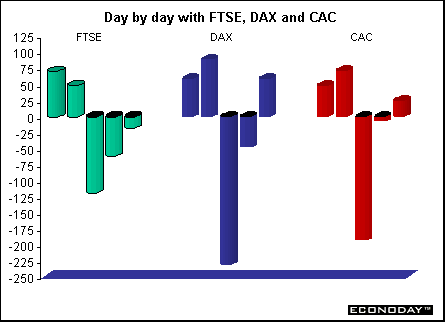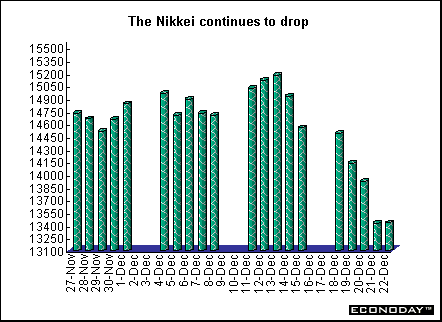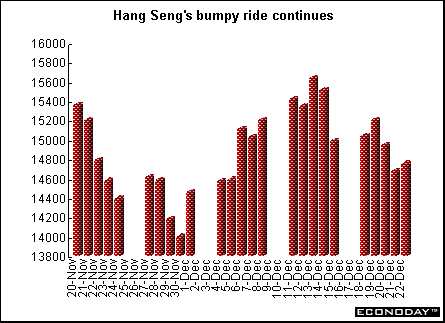
Europe and Britain
European investors continue to be rattled by the steep drop in U.S. equities. At this point, they are betting that their economies are not going to soften as much as the United States. Europe is less vulnerable to a slumping stock market because equity holdings equal roughly half of household disposable income in Germany and France against 160 percent in the United States.

Investors are now looking ahead to 2001 and hoping for a much better year for equity markets. Unless an amazing rally occurs over the next few days, the FTSE 100 will have had its first down year since 1994. That is highly unusual - the FTSE has only suffered two declines since 1976. The Frankfurt DAX and Paris CAC sank over the year as well.
Asia
The sinking U.S. markets rocked equities. Worries abound that weak U.S. growth will translate directly to lower exports and sales. Domestic economies are not picking up the slack. Furthermore, as the U.S. slips, so do other countries that rely on the U.S. growth engine (the U.S. accounts for 50 percent of world growth).

The Nikkei has lost more than 29 percent since the beginning of 2000 and is at its lowest level in nearly two years as the Japanese economy struggles to emerge from its worst slump in 50 years. Recent data has hinted that the recovery, boosted by multiple government spending programs, is in jeopardy of aborting. Japanese investors had pinned hopes on the Federal Reserve, but the Nikkei (and all other Asian markets) declined after the Fed said that weakness rather than inflation is the key threat to the U.S. economy - but left rates unchanged.
The Hong Kong Hang Seng was particularly rattled by the Bank of England's warning that bank loans to telecoms will turn sour and weigh on lenders. This was the second time that the Bank of England said it is concerned companies have taken out loans to finance projects that won't pay off for decades. Investors here were also disappointed that the Fed did not lower interest rates. Because the Hong Kong dollar is linked to the U.S. dollar, interest rates here are directly affected by Fed actions. Lower interest rates would help the struggling real estate and financial sectors.



Introduction • Global Stock Market Indexes • Recap of Global Markets • Currencies • Indicator Scoreboard

The Bottom Line • Looking Ahead
© Econoday, 2000. All Rights Reserved.
|